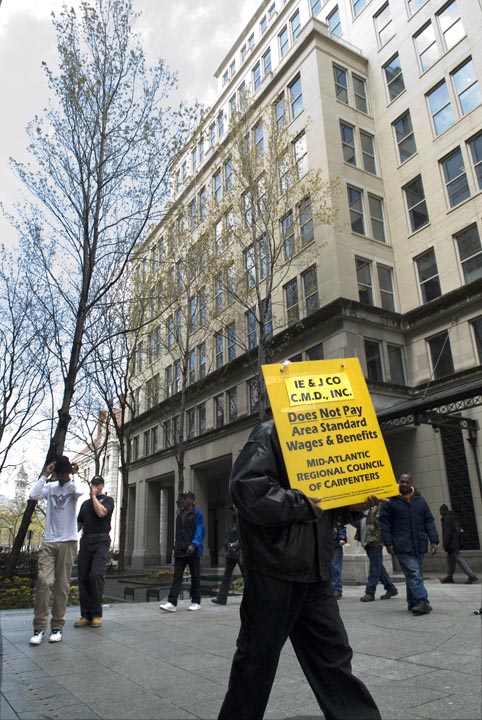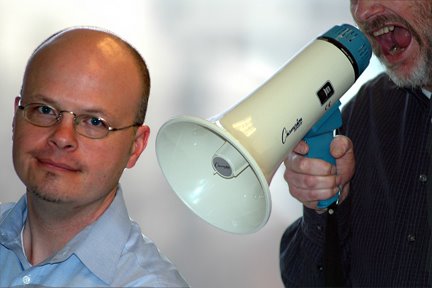VOH: Noise Ordinance Bill Battle Likely
While our neighborhood withers under one particular "religious" group's amplifier every weekend, labor unions also have a dog in this fight. It’s a very big dog.
The labor union representative quoted in the story, Rick Powell, attended a meeting of residents, ANC representatives, Councilmembers Tommy Wells and Mary Cheh, and the Office of Attorney General.
Obviously some disagreements exist on how the proposed fix would balance quiet rights for residents and protest rights for labor unions. But the bill's form is not final: Cheh has promised a hearing on the legislation, which will ensure all affected parties and experts are heard.
While I respect Powell's position, I must emphasize that polluting the commons is not a right. Just as free speech does not mean you should be "forced to access and read this blog whenever I desire," free speech should not mean "forced to listen." A person's right to create noise ends at my ear, after all.
Let’s us little guys—D.C. residents and small business owners—stick together on this.
Noise ordinance bill battle likely
BY PATTI SHEA
A bill to strengthen the city noise ordinance was greeted with joy in one Northeast Capitol Hill neighborhood, but might not be as welcome with unions and civil rights organizations downtown.
Ward 6 Councilman Tommy Wells proposed the Noise Control Protect Act after residents on and near Eighth Street, NE, convinced him that street preachers who gather near their homes every Saturday are exploiting a loophole written into the D.C. regulations.
At issue are members of a sect of the Israelite School of Universal Practical Knowledge who gather at the southeast portion of Eighth and H streets, NE, to preach sermons. Residents have been complaining to city officials for more than two years about the noise levels emitted from the group’s amplifiers. The residents have repeatedly said it’s not the content of the speech — the group has hung Jesus Christ and Santa Claus in effigy and said racial and homophobic slurs to passers-by who attempt to debate them — but the noise level that has them irked.
Wells promised the residents during his campaign that if elected he would plug the loophole. “This bill is intended to change the definition of a noise disturbance to both protect the First Amendment free speech as well as protect the health and peace of residents from amplified noise,” he said.
The noise code was changed in 2004 to exempt non-commercial speech during daylight hours. However, proponents of Wells’ bill say a loophole was created when the legislation language lifted all noise limitations citywide.
Unions agreed with the change after they were fined under the city’s noise ordinances during a protest at a downtown hotel.
If passed, Wells’ bill would better define noise parameters and sets a distance from which the noise will be measured. “A noise shall not be considered a noise disturbance if it is made during non-commercial public speaking during the daytime and does not exceed 70 decibels when measured at a distance of 50 feet from the source of the noise,” the bill states.
Wells said he expects to be brushed back by local union groups. “I expect strong union opposition,” he said. “But I’m really counting on the community, not just those affected by the noise, but all the residents of every ward that might be impacted by similar noise to provide the political will to get this done.”
The councilman said he worked on the bill with Ward 3 Councilwoman Mary Cheh, who is a constitutional law professor and head of the consumer and regulatory committee that will first consider the bill, to make sure no constitutional rights are being violated.
Wells said he consulted members from the local unions and civil rights offices in crafting the language.
Art Spitzer of the American Civil Liberties Union’s D.C. office said he couldn’t comment on the organization’s position at this time.
“The ACLU was very involved in helping to create the existing statutory exemption for noncommercial public speaking, which was intended to ensure that speech protected by the First Amendment would not be improperly silenced, so we'll take a careful look at this bill,” Spitzer said in a statement to The Voice.
Rick Powell, the political director for the local AFL-CIO, said Wells’ bill strips basic free speech rights from all D.C. residents, not just the group on the corner of Eighth and H streets.
“Aside from the group on H Street, there is no record of the current law being a problem,” Powell said. “We haven’t seen any evidence to date, aside from this group of citizens in Northeast.”
Powell said that there is a better way to handle the street preachers rather than taking away all D.C. residents’ right to protest. “People who want a resolution will find a way to get a resolution.”
Asked if he would mind the group conducting a sermon across the street from his house, Powell said, “I doubt if I would like it, but I would figure out a way to solve the problem.”
“While we appreciate not only the concerns but the problems the neighbors are having, we have to ask ‘how are the rest of us going to be protected?’” Powell added. “There’s a price you pay to live in a free society.”
During his 2006 campaign, Wells was endorsed by a handful of unions, including the AFL-CIO, American Federation of State, County and Municipal Employees (AFSCME) and the American Federation of Government Employees (AFGE).
Contrary to what Powell thinks, Eighth Street resident Dave Klavitter said the bill needs more teeth. Klavitter knows first hand about the noise levels as his home is roughly 50 feet from the corner in question.
“[The bill] will make the situation better for residents, but I don’t know by how much until we can test it. I don’t know if the legislation goes far enough,” Klavitter said. “I’m glad there’s progress being made. At least we’re ahead of where we were this time last year.”
The corner preachers have been clocked as high as 91.5 decibels and as low as 75.3 decibels, according to a report by the Department of Consumer and Regulatory Affairs.
Wells said the 70-decibel level was reached after consulting the Environmental Protection Agency and metropolitan cities that have similar ordinances.




